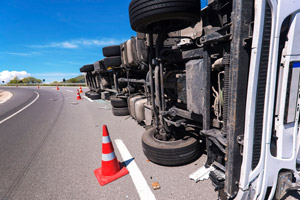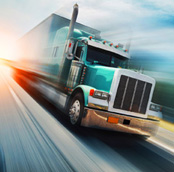Trucking Accidents
 Commercial trucks are encountered by drivers every day. Because 18-wheelers are significantly larger than personal vehicles, accidents between the two can cause significant injuries, or even death. To protect yourself and your loved ones, it is important to understand what laws apply to truck drivers, what you need to prove to win an accident case, and what damages you may be able to recover.
Commercial trucks are encountered by drivers every day. Because 18-wheelers are significantly larger than personal vehicles, accidents between the two can cause significant injuries, or even death. To protect yourself and your loved ones, it is important to understand what laws apply to truck drivers, what you need to prove to win an accident case, and what damages you may be able to recover.
Applicable laws
The safety of drivers on all roads and highways is a high priority for both state and federal lawmakers. State and federal laws establish standards that regulate drivers and the companies that employ them. The primary federal agencies responsible for regulation of the trucking industry are the United States Department of Transportation (DOT) and the Federal Motor Carrier Safety Administration (FMCSA). Federal regulations related to the trucking industry can be found in Title 49 of the Code of Federal Regulations. Eachstate has its own department of transportation, which regulates commercial trucking traffic on roadways. Often, a state’s department of transportation will work with the corresponding department of motor vehicles to oversee the state trucking industry.
If you or a loved one is in an accident with an 18-wheeler, you may want to understand the basic laws truck drivers and their employers must follow. Below are brief descriptions of some applicable laws.
Commercial driving license
The driver’s license issued to most people does not allow them to drive a large commercial vehicle. Driving a commercial vehicle requires a much higher level of experience, skill, knowledge, and physical ability than driving a passenger car, pickup truck, or SUV. The higher level of risk associated with driving a commercial vehicle requires the driver to exercise a higher standard of care. A commercial driver’s license requires the applicant to pass a test to ensure that the driver’s skills and knowledge meet those higher standards.
If you are injured in an accident with an 18-wheeler or other commercial vehicle and the driver does not have the proper license, contact an attorney immediately.
Hazardous waste
Commercial trucks are used to transport hazardous waste on highways and other public roads. To protect the public, the Environmental Protection Agency (EPA) and DOT have developed regulations under the Resource Conservation and Recovery Act. These regulations require transporters of hazardous waste to follow guidelines aimed at protecting our community and environment. Transporters must obtain an EPA identification number that allows the EPA to keep track of hazardous waste transporters. The transporters must also comply with the hazardous waste manifest system that tracks the waste from the time it leaves the facility until it arrives at the off-site waste facility. If a transporter discharges or spills hazardous waste, the regulations require that they take appropriate, immediate action to protect both human health and the environment. Transporters also must comply with labeling, marking, placarding, and container requirements set by the DOT.
If you are harmed in an accident where a driver transporting hazardous waste in an 18-wheeler failed to comply with federal regulations, you should contact an attorney. You may have a claim against the driver or trucking company, or against the company shipping the hazardous waste.
Hours of service
The FMCSA also regulates the number of hours that a commercial truck driver can legally drive without taking time to rest. The Hours of Service of Drivers Final Rule sets limits on the number of hours a property-carrying driver can safely operate a vehicle. If you or a loved one is harmed in an accident with an individual who has been driving the commercial vehicle for longer than allowed, you may be able to recover damages.
Liability in 18-wheeler accidents
If you are injured in an accident with an 18-wheeler, you must prove that the driver or other party, such as the driver’s employer, is responsible for your injuries. In certain cases, only the drive is liable. In others, both the driver, individually, and his employer, can be held liable. Finally, where an accident is caused by improperly-manufactured parts, or where a mechanic has failed to properly maintain the vehicle, other parties may incur liability.
Driver Liability
There are a few situations in which the driver alone can be held liable for an accident. If the driver commits an intentional act that causes the accident, they will be individually liable. For example, if a truck driver gets angry because a car cuts him off, and the truck driver intentionally runs the car off the road, the truck driver will be individually liable for any injuries. Also, a trucking company will not be liable if an accident occurs while the driver is acting outside the scope of his employment, for example, taking a detour for a personal errand. Finally, if the driver is working as an independent contractor, and is not an employee, then only the driver, and not the company, will be liable.
Employer liability
A truck driver’s employer can be held liable only if the driver was operating the truck in the scope of their employment at the time of the accident, and the driver did not take any intentional action to cause the accident.
Other
If the accident and resulting injuries are the result of a defective part on the 18-wheeler, the manufacturer of the part may incur liability. For example, if you get into an accident because the breaks give out, the manufacturer of the faulty brakes may be held liable. Similarly, if an auto mechanic does not properly maintain the truck, they may incur liability.
Damages
Truck accidents cause not only physical damage, but also emotional damage, including the stress associated with the costs incurred. If you or a loved one is involved in an 18-wheeler accident and suffer loss, you may be eligible to receive damages. The various forms of damages include medical expenses, pain and suffering, lost wages, and loss of earning capacity.
Related page: Car Accidents
Connect with Top-rated Attorneys Near You
Sponsored Advertisement
Other Personal Injury Law Center Topics
Damages
Your Rights When You Have Been Injured by a Dangerous or Defective Product
Adderall and Ritalin
Protecting Your Legal Rights After a Car Accident
Your Rights After a Construction Accident
Defective Drug Claims
Defective Drugs and Medical Devices Law Center
Dog Bites
Fosamax
Hormone Replacement Therapy
Ketek
Kugel Mesh Patch
Recovering Compensation After Medical Malpractice
Medtronic Defibrillators
Medtronic Pacemakers
Understanding Negligence in a Personal Injury Claim
Neurontin
Nursing Home Neglect and Abuse
Ortho Evra
Other Personal Injury
Other Professional Malpractice
Your Rights in a Premises Liability Claim
Prempro
Seroquel
Sulzer Hip Implants
Toxic Tort
Wrongful Death
Zyprexa
Defective Drugs & Medical Devices
Latest Article
What Is a Trust Fund? A Comprehensive Guide
A trust fund is a powerful tool that has stood the test of time. It is an essential instrument in modern wealth manageme... Read More
Arraignment: Meaning, Common Charges, & Process
Arraignment is a pivotal moment within the criminal justice system, marking the formal initiation of criminal proceeding... Read More
What Is Probable Cause? Definition and Examples
The Constitution protects you from being searched without a valid reason. But what exactly constitutes a valid reason? A... Read More
GETLEGAL®ATTORNEY DIRECTORY
Find Leading Attorneys in Your Area
NEED PROFESSIONAL HELP?
Talk to an Attorney
How It Works
- Briefly tell us about your case
- Provide your contact information
- Choose attorneys to contact you





